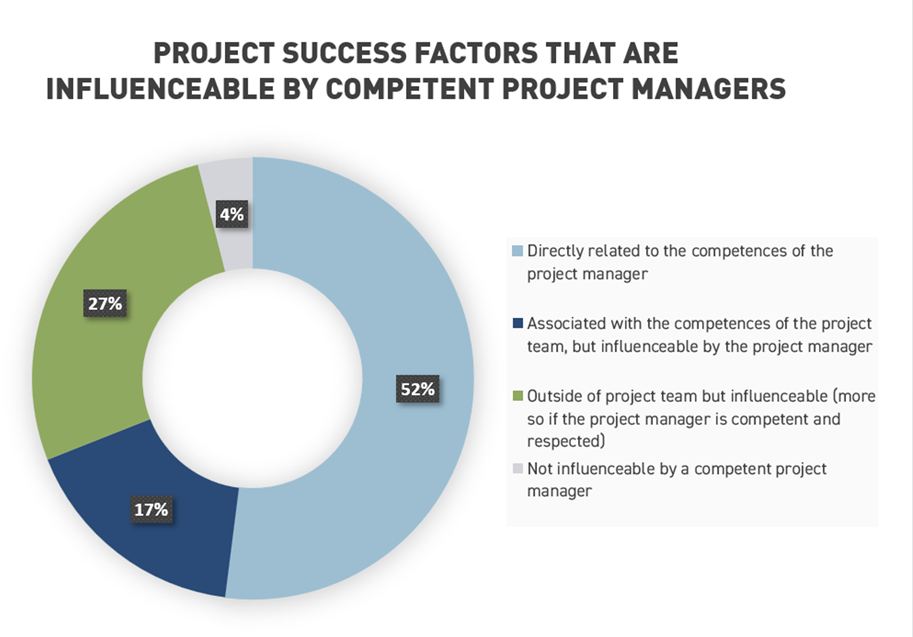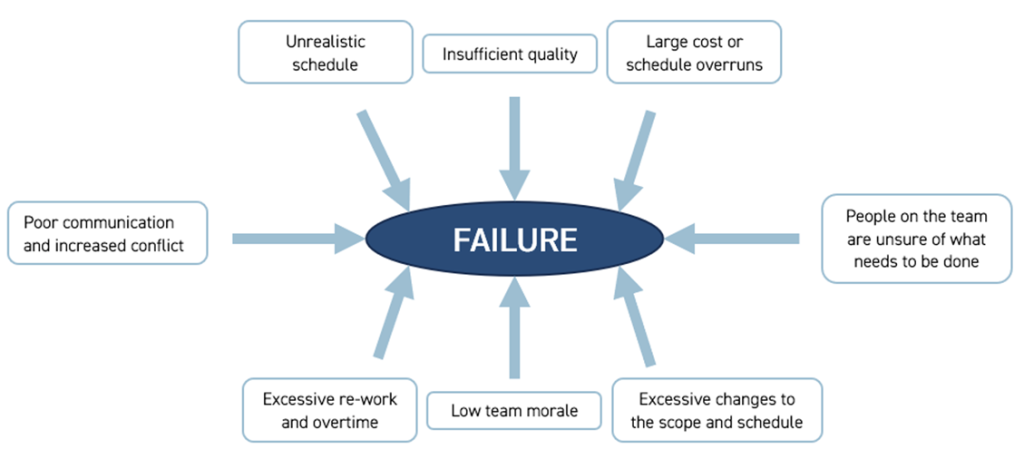Unleashing The Power Of Overqualified Project Managers: Why More Is Better

In the world of project management, we often hear about the term “overqualified” being used when experienced project managers seek new opportunities.
(Article provided by Association of International Project Management Officers (AIPMO ®).
It’s a perplexing phenomenon. Even when these seasoned professionals offer their expertise at a comparable salary to their less-experienced counterparts, they are still met with skepticism.
This article delves into the implications of this trend for both short- and long-term organizational success. Are organizations missing out on a valuable resource by rejecting “overqualified” project managers? Let’s explore this concept.
The Link Between Competent Project Managers and Project Success
In a study by Khan et al. (2013),[1] researchers identified 70 project success factors based on 40 years of project management research. Among these factors, one stood out: “a competent project manager.”
Surprisingly, this factor directly impacted 52% of success factors and indirectly influenced 44%. In other words, a competent project manager plays a significant role in project success, affecting almost 96% of the known success factors.

Figure 1: Project success factors that are influenceable by “Competent Project Managers.” Analysis from findings from Khan et al., 2013.
Therefore, if competent project managers have such a profound impact on success, why do project failure rates remain stubbornly high? Perhaps it’s because the term “competent” means different things to different people. Competence is not a straightforward concept.
Crawford’s (2005)[2] study on project management competence revealed that the definition of competence has evolved over time and can vary widely across organizations. This divergence in understanding competence may be contributing to the high rate of project failures.
Project Failures: A Costly Dilemma
Project failures come at a hefty cost, estimated in the hundreds of billions of dollars annually (McManus & Wood-Harper, 2008).[3]
These failures aren’t confined to a specific industry; they affect organizations across the board. What’s often overlooked is the personal toll these failures take on individuals, affecting their health, relationships, and well-being.
As we witness the harm poorly performing project teams inflict on team members’ well-being and personal lives, it’s important to uncover why projects go wrong in the first place.
Why do those in influential positions fail to grasp the importance of success factors? Why do they neglect monitoring and timely corrective actions?
The Cause of the “Overqualified Project Manager” Phenomenon
In discussions about the qualifications of project manager applicants, different perspectives often emerge.
Junior team members frequently express that project manager applicants can be excessively qualified. Conversely, seasoned senior project managers tend to assert a resolute “No.” They argue that a project manager’s role can evolve and require additional competences not initially part of the job description. This observation aligns with the findings of Shrnhur et al. (1997),[4] who noted that project managers often need more than what their job descriptions entail.
This discrepancy in responses raises a fundamental question: Is a job description tailored for the immediate project, or does it reflect the long-term role of a project manager? We’ll return to this question shortly.
Why the “Overqualified” Label Persists
The phenomenon of rejecting overqualified project managers can be attributed to several factors:
- Misunderstanding of role differences: Project and operational roles differ significantly in terms of their nature, duration, and expectations. Operational roles are long-term, while project managers move from one project to another, necessitating a broader skill set.
- Recruitment briefs and interpretations: Personnel departments often recruit based on briefings and job descriptions from hiring managers. These briefs may focus on immediate project needs rather than long-term competence requirements.
- Insecurity among recruiters: Some individuals responsible for recruiting project managers may exhibit insecurity in their positions. They may feel threatened by candidates who possess more knowledge or experience than themselves.
Detrimental Effects on Organizations
Rejecting overqualified project managers has dire consequences for organizations. It increases the risk of project failure by depriving teams of valuable expertise and competence reserves. Organizations often choose less experienced project managers, leading to suboptimal outcomes. In essence, organizations should prioritize “top sizing” their project managers, selecting those with ample competences and experience.

Figure 2: Rejecting overqualified project managers: The potential organizational consequences. Analysis from AIPMO.
The Need for the “A-Team”
In mission-critical situations, selecting anything less than the best is a risk few can afford. Whether in the corporate world or special forces, “A-teams” are assembled to ensure success. These individuals are not merely qualified; they possess an abundance of reserves, ensuring they can tackle any challenge that arises.
Success is often linked to the company of capable individuals. The emphasis should not solely be on choosing a project manager who appears highly qualified on paper; rather, the focus should be on utilizing their extensive experience and skills when necessary.
The Impact of Overqualified Project Managers
Overqualified project managers, far from being a liability, are often the secret to successful project outcomes. Here are a few reasons why they should be sought after:
- Depth of experience: Overqualified project managers bring a wealth of experience to the table. They’ve been through various challenges and have a broader perspective on how to navigate complex projects.
- Reserve competences: In the dynamic world of project management, unexpected issues can arise. Overqualified project managers act as a reservoir of competences that can be tapped into when crises occur, ensuring that projects stay on track.
- Team leadership: Overqualified project managers often possess exceptional leadership skills. They can inspire and guide teams to overcome obstacles, fostering a positive work environment that contributes to project success.
- Risk management: Experience allows overqualified project managers to anticipate and mitigate risks effectively. Their proactive approach can prevent issues from snowballing into project-threatening problems.
Embracing Overqualified Project Managers as Long-Term Assets
To harness the full potential of overqualified project managers, organizations should take several strategic steps:
- Flexible job descriptions: Job descriptions should be adaptable to the evolving needs of projects. Rather than a rigid checklist of requirements, they should outline the core competences while leaving room for additional skills to be leveraged when necessary.
- Mentoring programs: Organizations should consider mentorship programs where less experienced project managers can learn from their overqualified counterparts. This not only helps in knowledge transfer but also fosters a culture of continuous learning.
- Recognizing potential for growth: The role of a project manager is not static. Over time, projects may become more complex, requiring a broader skill set. Organizations should identify the potential for growth within their project managers and encourage professional development.
- Performance metrics: Traditional performance metrics should be augmented to account for long-term success. While immediate project delivery is crucial, organizations should also measure the impact of project managers on the overall health of their teams and their ability to manage crises effectively.
Conclusion: Overqualified Project Managers as Long-Term Assets
In closing, organizations should embrace the idea of “overqualified” project managers as long-term assets. These individuals, equipped with competences and reserves, are the key to consistent project success. They not only drive projects toward successful outcomes but also foster team satisfaction—a critical factor in project success.
So, to those responsible for recruiting project managers, consider this: Seek out and advertise for overqualified project managers. They are the rare resources that can become your organization’s most valuable long-term assets.
In a world where project failures are costly and prevalent, having a team of overqualified project managers might just be the competitive advantage that sets your organization apart and ensures consistent success in the long run. So, don’t settle for less when you can have the best.
[1] Khan, K., Turner, J. R., & Maqsood, T. (2013, June). Factors that influence the success of public sector projects in Pakistan. In Proceedings of IRNOP 2013 Conference (pp. 17-19). Oslo: BI Norwegian Business School.
[2] Crawford, L. (2005). Senior management perceptions of project management competence. International Journal of Project Management, 23(1), 7–16. doi:10.1016/j.ijproman.2004.06.005
[3] McManus, J., & Wood-Harper, T. (2008). A study in project failure-BCS. Retrieved 19/4/2012, 2012, from http://www. bcs. org/content/ConWebDoc/19584.
[4] Shrnhur, A., Levy, O., & Dvir, D. (1997). Mapping the dimensions of project success. Project Management Journal, 28(2), 5–13.
Article by Association of International Project Management Officers (AIPMO®).




